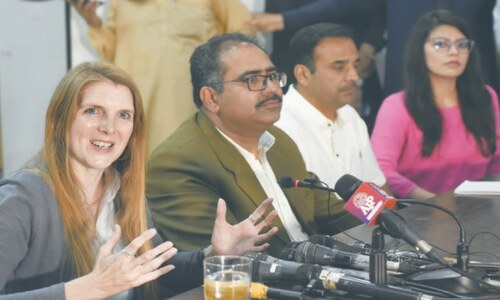ISLAMABAD, Aug 30: Textile training workshop for master artisans kicks off at Lok Virsa on Thursday.
Over 25 craftsmen and craftswomen from different parts of Pakistan in various craft fields are participating in the workshop-cum-display which will continue for 14 consecutive days, said Khalid Javed, executive director Lok Virsa.
He said that the existence of developed crafts of cloth weaving and dyeing in the Indus Valley five thousand years ago has been proven by the discovery of spindle whorls, bobbins, and a dyer’s workshop at Mohenjodaro.
When we talk about traditional textile, one will find a wide range of products created by master craftspeople such as khaddar, khes, lungi, sussi, shawls, carpets, pattu, patti, farrasi and other embroidered artifacts, he said.
The simplest cotton weave, ‘khaddar’, described generally as coarse cloth, has retained its peculiar charm ever since it made its appearance thousands of years ago.
One of the widest uses of unstitched cotton textiles is in the form of ‘khes’ – a patterned and bound double weave cloth. The tradition of draped clothing has been sustained in Pakistan by a number of factors – easily notable ones being the climate and the artisans’ habit of attending to their work mostly in a squatting position.
Sussi is also an ancient cloth of Pakistan. It is very popular for its pretty colours throughout the world. It is used for the garments and adornment of ladies.
Farasi making is a part of the rich tradition of weaving rugs with goat hair, camel hair and mixed yarn. These are woven in warp and weft on horizontal looms, generally portraying geometric patterns.
Pattu, a woolen cloth, is usually woven in Chitral and Gilgit. It is made of sheep wool in natural colours. The sheep wool is spun by women on “Charkhas”, a handmade spinning wheel.
Weaving of the cloth is done by men on a locally manufactured floor-loom, in strips of fourteen to twenty inches in width.
Embroidery is the embellishment of any material with pattern or design done with the needle and thread on material. It reflects the local traditions, cultural and physical environment of people and places where it was developed.
Each area of the country has evolved its own distinct type and style of typical traditional work.
According to the given schedule, timings for training workshop are daily between 10:00am to 1:00pm, whereas the display and sales of artisans’ products will take place at Lok Virsa shops adjacent to open air theatre daily between 3:00 to 9:00 p.m till 12 September 2012.














































Dear visitor, the comments section is undergoing an overhaul and will return soon.